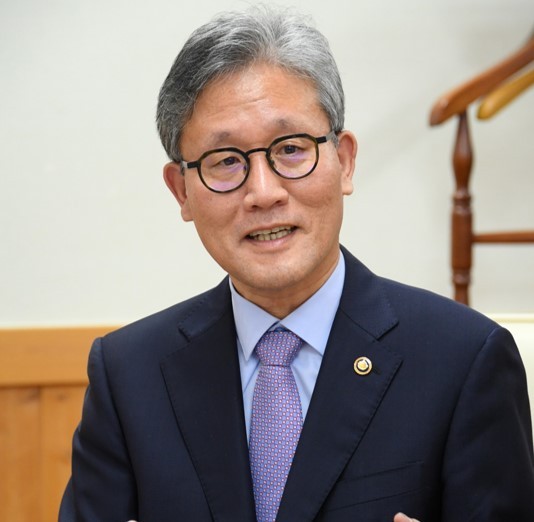South Korea is suffering from worsening air pollution each year. Every spring, the concentrations of fine dust particles surge to record levels across the country, threatening human health and environmental sustainability.
The state-run Korea Forest Service is seeking to deploy forests to combat air pollution, help people stay cooler during heat waves and increase well-being in nature.
“The primary factor behind serious fine dust pollution is air pollutants from industrial complexes, thermal power stations and car exhaust. However, the decline of green areas is also one of the factors,” said Kim Jae-hyun, minister of the Korea Forest Service, in an interview with The Korea Herald.
 |
Kim Jae-hyun, minister of Korea Forest Service (KFS) |
Trees have the function of purifying air by absorbing pollutants. Their transpiration and shade can lower temperatures by up to 7 degrees Celsius in the scorching heat, according to Kim.
“To combat fine dust pollution and urban heat island (effect), we are actively pushing ahead with plans to expand forests and pursuing policies to healthily manage them,” the minister said.
One of the major policies to bring cleaner and fresher air into the cities is “wind road forests,” he said.
Wind road forests refer to organically connected forests surrounding a city to forests in the town to bring cleaner and more cooling air into the city. The agency plans to build wind road forests in 17 cities by 2022 with an investment of 340 billion won ($288 million).
Alongside the wind road forests, the Korea Forest Service is planting trees in industrial districts to purify the air. The agency plans to invest 30 billion won every year to form 60 hectares of forest a year.
Forests also serve as a healing therapy for the public by promoting mental and physical health and enhancing the level of immunity, he said.
“Forest-related healing business has the potential to grow when it is combined with food, accommodations and mountain village experiences,” the minister said.
Currently, the Korea Forest Service is running 24 healing forests nationwide to provide visitors with clean air, freshwater and rest areas with nature.
The KFS is also promoting afforestation in Mongolia, which is now at risk of desertification.
From 2007 to 2016, the KFS planted trees in Mongolian deserts with a combined area of 3,000 hectares to prevent desertification and reduce damages from yellow dust. The agency is now pushing to plant forests in cities inside the nation through 2021.
“The green belt reforestation serves as momentum for Mongolians to learn the importance of forests. It also affected the nation’s policymaking to designate a tree-planting day and to conduct a campaign to plant 1 million trees nationwide,” he said.
By Shin Ji-hye and Lee Kwon-hyoung
(
shinjh@heraldcorp.com), (kwonhl@heraldcorp.com)








